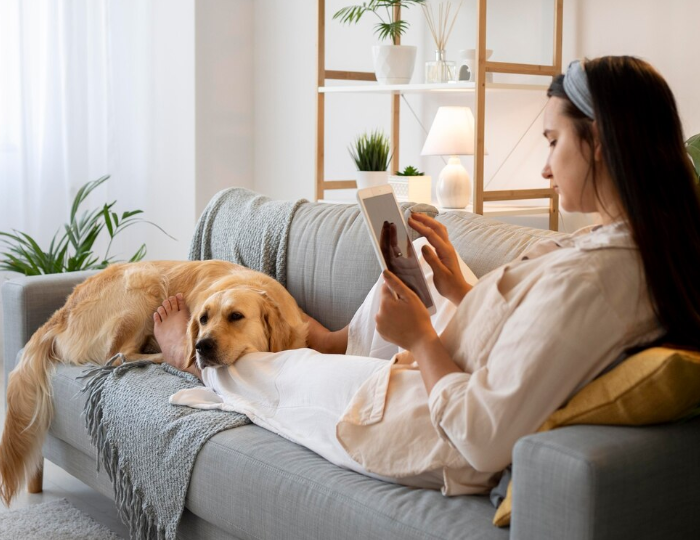Assistance dogs are trained animals that offer vital support to individuals with disabilities, helping them navigate daily challenges and regain independence. In Scotland, assistance dogs play a crucial role in supporting people with a wide range of needs, including physical disabilities, sensory impairments, and mental health conditions. These highly trained dogs enhance the lives of their handlers by performing tasks that increase safety, provide emotional support, and improve overall well-being.
This guide covers everything you need to know about finding assistance dogs in Scotland—from understanding the benefits to accessing available resources and support. Whether you’re looking for a guide dog, hearing dog, or psychiatric assistance dog, this article will outline essential information to help you or a loved one begin the journey toward greater independence and improved quality of life with an assistance dog.
Types of Assistance Dogs and Their Roles
Scotland is home to a variety of assistance dog organizations that train dogs to support individuals with specific needs. Each type of assistance dog performs tasks tailored to its handler’s unique requirements:
1. Guide Dogs: Guide dogs help people with visual impairments navigate daily tasks independently. Trained to avoid obstacles, follow pathways, and locate destinations, guide dogs empower those who are blind or visually impaired by providing mobility and freedom.
2. Hearing Dogs: For individuals who are deaf or have hearing impairments, hearing dogs are trained to alert their handlers to important sounds, such as doorbells, alarms, or someone calling their name. This allows their handlers to engage more fully with the world around them, reducing isolation and increasing safety.
3. Mobility Assistance Dogs: These dogs help people with physical disabilities manage daily activities by retrieving items, opening doors, assisting with balance, and pressing buttons. For those with limited physical mobility, these dogs provide essential support that enhances both convenience and independence.
4. Medical Alert Dogs: Medical alert dogs are trained to detect and respond to specific medical conditions, such as low blood sugar levels in people with diabetes or the onset of seizures in those with epilepsy. Medical alert dogs offer a proactive level of care by alerting handlers to potential emergencies, allowing them to take preventive measures.
5. Psychiatric Assistance Dogs: Psychiatric assistance dogs support individuals with mental health conditions, including PTSD, anxiety, and depression. They provide grounding during episodes of distress, alert their handler to panic attacks, and create a calming presence that helps mitigate symptoms, supporting mental health and well-being.
Understanding the types of assistance dogs available is the first step in identifying the right fit for a person’s needs. Each category of assistance dog serves a unique purpose and undergoes specialized training to perform its role effectively.
Benefits of Assistance Dogs in Scotland
Assistance dogs offer a range of life-enhancing benefits that impact both the physical and emotional well-being of their handlers. Here are some key benefits:
Increased Independence
Assistance dogs empower their handlers to achieve greater independence by supporting them in tasks they might otherwise need help with. Guide dogs, for example, allow people with visual impairments to travel safely on their own, while mobility assistance dogs help those with physical disabilities navigate daily tasks. This independence fosters a sense of self-confidence and dignity.
Emotional and Mental Health Support
Many assistance dogs offer emotional support that significantly enhances mental well-being. Psychiatric assistance dogs, for instance, provide a calming presence and alert their handlers during anxiety or panic attacks. The presence of an assistance dog can alleviate symptoms of mental health conditions, creating a greater sense of peace and emotional stability.
Physical Assistance
Mobility assistance dogs are invaluable for people with physical disabilities, as they perform essential tasks like retrieving dropped items, opening doors, and helping with balance. These tasks make daily activities more manageable and help reduce the need for additional assistance, allowing for a more independent lifestyle.
Social Benefits
Assistance dogs can act as a bridge in social situations, helping their handlers engage with others more confidently. They often spark conversations, making it easier for their handlers to socialize and interact with people. This is particularly beneficial for those with social anxiety or individuals who may feel isolated due to their disabilities.
Enhanced Safety
For those with medical conditions, assistance dogs provide enhanced safety and peace of mind. Medical alert dogs can detect changes in blood sugar levels or impending seizures, giving their handlers the opportunity to take preventive action before a serious incident occurs. This proactive support is lifesaving and allows individuals to go about their daily lives with confidence.
Key Organizations Providing Assistance Dogs in Scotland
Several organizations across Scotland are dedicated to training and providing assistance dogs to those in need. Here’s a look at some of the leading organizations:
1. Guide Dogs Scotland
Guide Dogs Scotland focuses on training guide dogs specifically for people with visual impairments, allowing them to navigate the world with greater freedom.
• Services and Application: The organization offers a structured matching program that pairs each handler with a dog suited to their lifestyle and needs. Interested individuals can apply through Guide Dogs Scotland’s website or visit a local branch.
2. Hearing Dogs for Deaf People
Hearing Dogs for Deaf People trains hearing dogs to support people with hearing impairments by alerting them to sounds essential for safety and social interaction.
• Application Process: Applications can be submitted online, and the organization performs assessments to ensure each dog matches the specific needs of its future handler.
3. Assistance Dogs Scotland
Assistance Dogs Scotland is a nonprofit organization that trains dogs for multiple categories, including medical alert, psychiatric support, and mobility assistance.
• Programs and Support: Assistance Dogs Scotland offers a variety of training programs and ongoing support, helping handlers and dogs maintain a strong, effective bond.
4. Canine Partners Scotland
Canine Partners Scotland trains mobility assistance dogs for individuals with physical disabilities. The organization provides dogs that assist with practical tasks, supporting greater autonomy.
• How to Apply: Applications are accepted online, and assessments are conducted to determine the best dog-handler match.
5. Service Dogs UK
Service Dogs UK primarily focuses on training psychiatric assistance dogs for individuals with PTSD, including veterans and emergency service workers. These dogs are trained to support individuals through episodes of anxiety, flashbacks, or panic attacks.
• Application and Support: More information on applications and services is available on the Service Dogs UK website.
6. Service Dog Training School
Service Dog Training School offers specialized training programs for various types of assistance dogs, including medical alert, psychiatric support, and mobility assistance dogs. Their programs provide comprehensive, customizable training designed to meet the specific needs of each handler and their unique requirements.
• Application Process: Handlers can apply for training programs directly through the Service Dog Training School’s website. The school offers a range of services, allowing handlers to select the training path that best suits their individual needs, whether they are seeking a fully trained dog or prefer to participate in self-training with professional guidance.
How to Apply for an Assistance Dog in Scotland
Applying for an assistance dog typically involves meeting specific eligibility requirements and following a structured process. Here’s what to expect:
Eligibility Criteria
To qualify for an assistance dog, applicants usually need:
• A diagnosed disability or condition that substantially affects daily life.
• A recommendation or referral from a healthcare provider, particularly for medical alert and psychiatric assistance dogs.
The Application Process
1. Initial Application: Start by completing the application form provided by the chosen organization. This form collects relevant details about the applicant’s medical history, specific needs, and daily lifestyle.
2. Assessments and Interviews: After an initial review, organizations may conduct interviews or home assessments to ensure the best match between handler and dog.
3. Training and Matching: Once approved, the handler is matched with a dog that has completed basic training. The handler then participates in further training to establish a strong working relationship.
Cost and Financial Support Options
Most organizations cover the majority of costs associated with training and placing an assistance dog. However, some may require partial contributions or donations. Financial support, including grants and funding from Scottish charities, may be available to help cover any out-of-pocket expenses.
Training and Support for Assistance Dogs in Scotland
Training Programs
Training assistance dogs involves a series of steps, including basic obedience, task-specific training, and socialization in various environments. The goal is to prepare the dog to meet its handler’s needs in a safe and effective way.
Ongoing Support for Handlers
Most organizations provide ongoing support, ensuring that handlers and dogs continue to work effectively together. This support often includes refresher training sessions, behavioral guidance, and access to trainers for any questions or issues that arise.
Resources for Self-Training Assistance Dogs
In Scotland, some individuals choose to self-train their assistance dogs. While self-training can be effective, it requires a significant commitment of time and knowledge. Resources are available for those interested in this option, including online guides, trainers, and support from local dog-training organizations.
Service Dog Training School offers online courses for assistance dog training, including options for those who wish to self-train their dog with professional guidance. Their courses cover obedience, task-specific training, and socialization, providing a flexible solution for people seeking well-trained assistance dogs. Handlers can enroll in training programs directly through their website, selecting from a range of services based on their requirements and preferences.
Get Your Service Dog Training Now
Legal Rights and Protections for Assistance Dogs in Scotland
Assistance dog handlers in Scotland are protected by UK laws that grant them access rights in public settings and workplace accommodations. Key rights include:
Access Rights in Public Spaces
Under UK law, assistance dogs are allowed in most public spaces, including shops, restaurants, and public transportation. Facilities are required to accommodate handlers and their assistance dogs, ensuring that handlers can access essential services and participate in community life.
Workplace Accommodations
Employers are required to make reasonable accommodations for assistance dogs, supporting handlers in performing their job duties. This is particularly important for individuals who need their dogs present during work to manage medical or psychiatric conditions.
Housing Rights
Assistance dogs are protected under housing laws, allowing them to live with their handlers even in rental properties with pet restrictions. This ensures that handlers can maintain their independence without fear of discrimination.
Travel and Transportation
Assistance dog handlers have the right to travel with their dogs on public transportation and airlines, providing greater flexibility and confidence for those who rely on their assistance dogs for support. In most cases, assistance dogs are allowed on buses, trains, and planes without additional fees, though handlers should check specific airline policies in advance to ensure a smooth travel experience.
Additional Resources and Support Networks
Having an assistance dog is a significant commitment, and many individuals benefit from community support, resources, and networks that provide additional guidance and help. Here are some valuable resources in Scotland:
Community and Support Groups
• Assistance Dog Support Network: This network offers both online and in-person support for assistance dog handlers, where members can share experiences, advice, and encouragement.
• Scottish Disability Support Forums: Several disability support organizations in Scotland host forums where assistance dog handlers can connect with others who understand the challenges and joys of having an assistance dog.
• Veterans’ Assistance Dog Support: Veterans’ organizations, such as those associated with Service Dogs UK, offer tailored resources and support groups for veterans with PTSD assistance dogs.
Mental Health and Disability Resources
• Scottish Association for Mental Health (SAMH): Provides mental health support, guidance, and services that may help individuals managing mental health conditions with the aid of a psychiatric assistance dog.
• Disability Information Scotland: Offers resources, helplines, and information on services for people with disabilities, including those with assistance dogs.
Financial Aid and Sponsorship Programs
• Scottish Assistance Dog Charities: Charities like Assistance Dogs Scotland and Guide Dogs Scotland often offer funding support or sponsorships to cover some of the costs associated with training, placing, and caring for an assistance dog.
• Government Support Programs: Individuals may qualify for certain disability benefits or grants to help cover costs related to assistance dogs. Consulting with local disability services can provide more information on available financial support.
These resources provide a robust support network for those with assistance dogs, ensuring handlers have access to the community, resources, and guidance needed to thrive with their canine companions.
Conclusion: Finding Support and Independence with Assistance Dogs in Scotland
Finding and working with an assistance dog in Scotland offers transformative benefits for individuals facing various challenges, from physical disabilities and sensory impairments to mental health conditions. Assistance dogs provide companionship, safety, and increased independence that greatly enhance their handlers’ quality of life.
To begin the journey toward finding an assistance dog, consider the resources and organizations in Scotland dedicated to providing well-trained assistance dogs. Whether you’re interested in guide dogs, hearing dogs, or psychiatric assistance dogs, programs like those offered by Guide Dogs Scotland, Hearing Dogs for Deaf People, and Assistance Dogs Scotland are excellent starting points.
By reaching out to these organizations, handlers can access application information, training programs, and financial assistance to make the dream of having an assistance dog a reality. With an assistance dog, individuals gain more than a helper—they gain a partner who offers unwavering support, peace of mind, and newfound independence.
If you or someone you know could benefit from an assistance dog, explore the resources listed here, reach out to Scottish assistance dog organizations, or consult with local disability support services. With the right assistance, you can embark on a life-changing journey toward greater independence and well-being with an assistance dog by your side.













